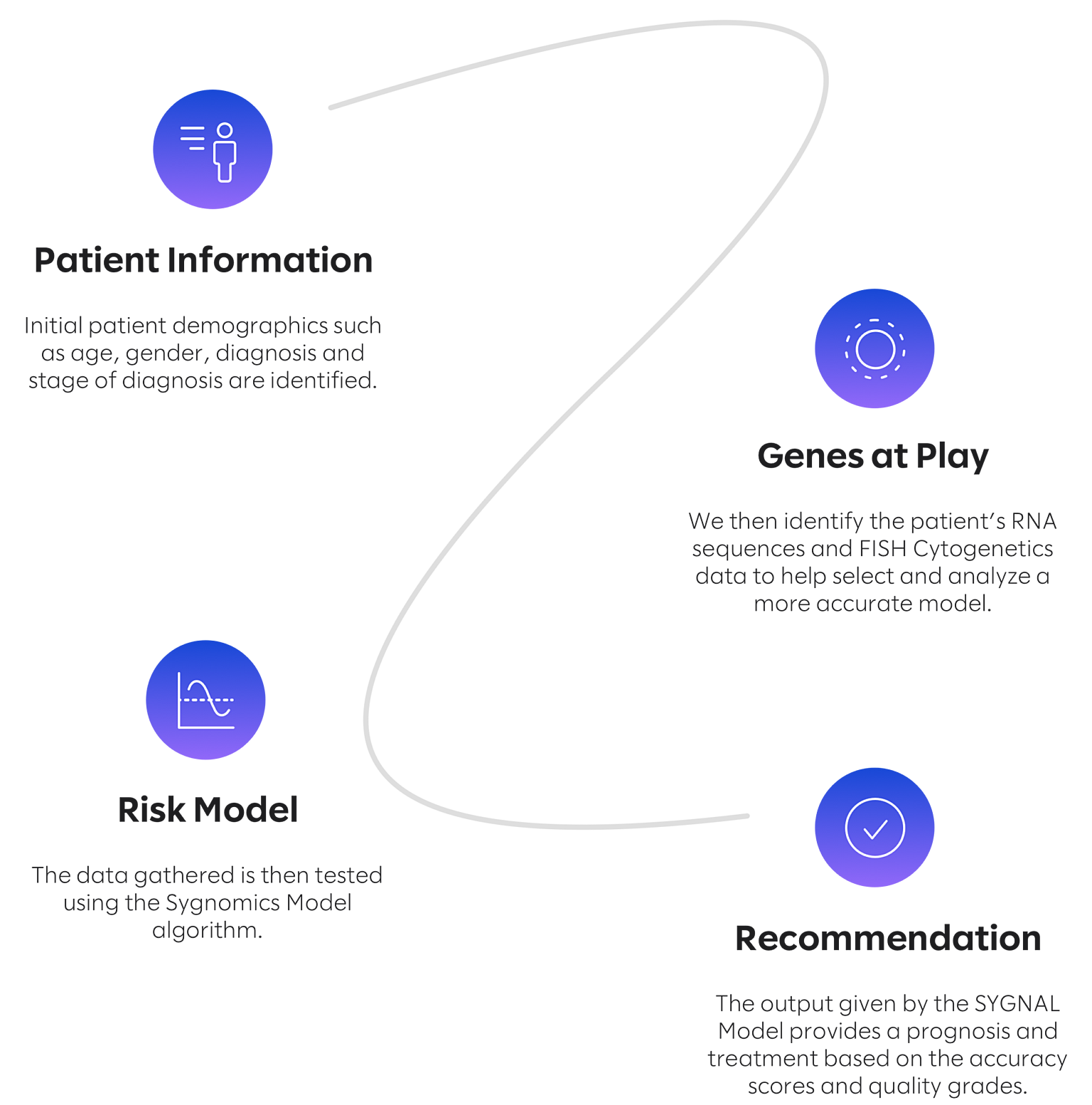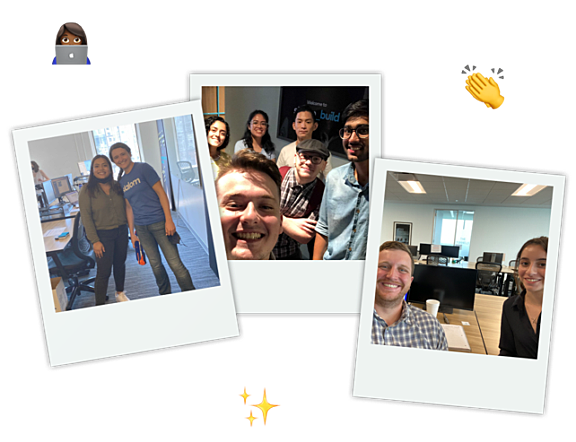Visualizing a path to better cancer treatment
OVERVIEW
Sygnomics is building a machine learning application to help oncologists better predict how a patient’s cancer will progress and tailor therapies to best match that profile. But they needed to show potential partners how the idea would work. In roughly two months, a team of Builders and Build interns developed a vision for what the product could be and delivered a functional prototype of a web-based app and data visualization dashboard that Sygnomics could take to oncologists to help them customize treatment for better outcomes.
SCOPE
Data Visualization, Data Encryption, User Interface Design, Authentication, AWS Managed Services, Serverless
TECHNOLOGY
Amazon Simple Storage Service (Amazon S3), AWS Lambda, Amazon DynamoDB, Amazon CloudFront, Amazon Cognito, React
Helping doctors see the fight against cancer differently
No one expects the fight against cancer to be easy. It’s a fight, after all. But the formidable challenge came into sharper focus when oncologists at Sygnomics explained that every cancer—and every cancer patient—is unique. It’s this complexity, in part, that causes most new cancer drugs to fail in clinical trials. Matching the right drug to each tumor is beyond difficult. And the risk and cost of failure loom unimaginably high.
But the oncologists and technologists at Sygnomics are working on a solution.
They’re creating Systems Genetics Network Analysis (SYGNAL), an intelligence platform designed to help doctors and researchers visualize how a patient’s cancer may progress and recommend treatments with predicted therapeutic efficacy for that profile. SYGNAL achieves this by comparing anonymized genetic and demographic information. Using a machine learning model, the platform can improve its recommendations over time as new expert-reviewed data is entered.
It’s a big idea—one that’s easier to explain with visual aid. That’s why Sygnomics wanted a functional prototype of a web-based app with data visualization dashboard to demonstrate SYGNAL to other oncologists and potential partners.

Building ‘easy-to-use’ is anything but simple
Destined for the desks of busy doctors and scientists, the user experience had to be intuitive. Design and visualizations needed to be scientifically useful as well as accurate and simple to understand. We conducted regular user testing sessions with oncologists to not only better understand their needs, but get a true, real-world measure of the efficacy of this proof-of-concept.
And in addition to the app, we also had to build trust. Our team worked to secure, anonymize, and encrypt the data to meet FDA and HIPAA compliance. And on the front end, it had to be contextualized so oncologists could easily be confident that the data came from an authoritative source.
What’s more, we didn’t have access to the complete dataset right away. So, initially the team worked with mock data that didn’t tell engineers everything they needed—which meant more research, data modeling, PII anonymization, and converting data to get it in the right format.
Like Sygnomics, we had our own idea to test. We added Builders from our 2021 paid internship program to a client-facing delivery team. Because we want our interns to work on real projects that come with real-life expectations and, naturally, real challenges. They were fully supported, coached, and mentored by builders from across the organization, but they truly ran the project.
In the end, the SYGNAL prototype we built allows users to create an account, log in, and view various dashboards presenting patient blueprints, relevant therapies, and risk analysis—all in a polished, responsive, easy-to-use web application that looks as good as it functions.
Finally, we also left them with a roadmap for how their machine learning model could further mature. This future-state architecture will help them more easily add value and flexibility to later iterations of the product, developing more personalized therapy recommendations for each patient.

In the fight against cancer, vision is key
This project reminds us why effective data visualization is so important: it translates complex information into digestible, shareable—and more powerful—ideas. With this platform, Sygnomics hopes to motivate oncologists to share more insights and help each other make greater progress. And that will mean better health outcomes for patients.
The SYGNAL platform is still in development, but with the important work of our teams, Sygnomics is closer to realizing its vision: Setting in motion a continuous learning loop to help oncologists help more people. It’s an exciting and hopeful idea that shows how important vision, and visualization, is in the fight against cancer.

“You should be incredibly proud of the all the work that you did. Hopefully someday you can see an oncologist using a piece of software and say, ‘I helped that patient get better.’ And that will be powerful.”
— Ashutosh Tiwary, Founder, Sygnomics
Building the future — with the future
The Slalom Build Internship program is all about doing. We believe in giving our Build interns real-world experience working with cross-functional teams to build actual digital products and experiences. Sygnomics was the perfect project for the program.
Fourteen engineering and design interns contributed to this project cross-functionally and remotely from Houston, Chicago, Seattle, Vancouver, Denver, and other cities. There was no shallow end in this pool. Interns dove right in, learning about Agile methodologies and our internal project tools for the first time. That’s in addition to tackling their assigned deliverables, which they presented to clients at progress updates.

Some interns started out a little nervous. What if they couldn’t answer a client’s question? What if they had never worked on this aspect of a project before?
A good internship doesn’t sail without mentors. We tapped Builders beyond our core team for specialized expertise in data encryption and authentication. And project mentors not only provided practical advice but helped the interns find a crucial ingredient for creativity: confidence. Interns reported that receiving feedback and encouragement from professional colleagues inspired them to keep pushing forward.

We’re also proud to say that, to date, we’ve hired eight of the 14 interns (those that weren’t headed back to school), who are now contributing their skills and vision to other Slalom Build projects.
There is something to be said for helping interns that are helping doctors that want to help patients get better. When the learning loop is constant—the possibilities are infinite and bright.
Learn more: See why our program ranked on the Vault’s Best 100 Internships list.
“This is how we do things at Slalom Build. It’s collaborative. It’s people first.”
— Becka Blackburn, Senior Solution Owner, Slalom Build
Next Up
